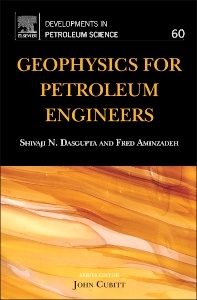Description
Geophysics for Petroleum Engineers
Developments in Petroleum Science Series
Authors: Aminzadeh Fred, Dasgupta Shivaji N.
Language: English
Subjects for Geophysics for Petroleum Engineers:
152.01 €
In Print (Delivery period: 14 days).
Add to cart
Publication date: 12-2013
344 p. · 15x22.8 cm · Hardback
344 p. · 15x22.8 cm · Hardback
Description
/li>Contents
/li>Readership
/li>Comment
/li>
Geophysics for Petroleum Engineers focuses on the applications of geophysics in addressing petroleum engineering problems. It explores the complementary features of geophysical techniques in better understanding, characterizing, producing and monitoring reservoirs.This book introduces engineers to geophysical methods so that they can communicate with geophysicist colleagues and appreciate the benefits of their work. These chapters describe fundamentals of geophysical techniques, their physical bases, their applications and limitations, as well as possible pitfalls in their misuse. Case study examples illustrate the integration of geophysical data with various other data types for predicting and describing reservoir rocks and fluid properties. The examples come from all over the world, with several case histories from the fields in the Middle East.
1. Introduction2. Fundamentals of Petroleum Geology a. Introductionb. Petroleum Reservoirs3. Fundamentals of Formation Evaluationa. Introduction to Well Logsb. Lithology Logsc. Porosity Logsd. Saturation Logs4. Fundamentals of Petroleum Geophysicsa. Introductionb. Seismic Reflection Techniquec. Multicomponent Seismicd. Non-Seismic Methodse. VSP and Checkshot Surveysf. Crosswell Seismic and Crosswell EM5. Fundamentals of Geostatistics6. Reservoir Characterizationa. Static Reservoir characterizationb. Geophysics for reserves and resources estimation7. Reservoir Monitoringa. Time lapse Geophysics b. EOR monitoringc. CO2 Sequestration and monitoring8. Drilling with Geophysics a. Geosteering and Seismic While Drilling (SWD)b. Pressure Predictionc. Infill Drilling9. Geophysics for unconventional Resourcesa. Characterizing fracture systemb. Hydraulic fracture monitoring
Geophysicists, geophysical engineers, and petroleum engineers
- Introduces geophysical methods to engineers
- Helps understanding, characterizing, producing and monitoring of geophysical techniques
- Updates the changing needs of reservoir engineering
© 2024 LAVOISIER S.A.S.




